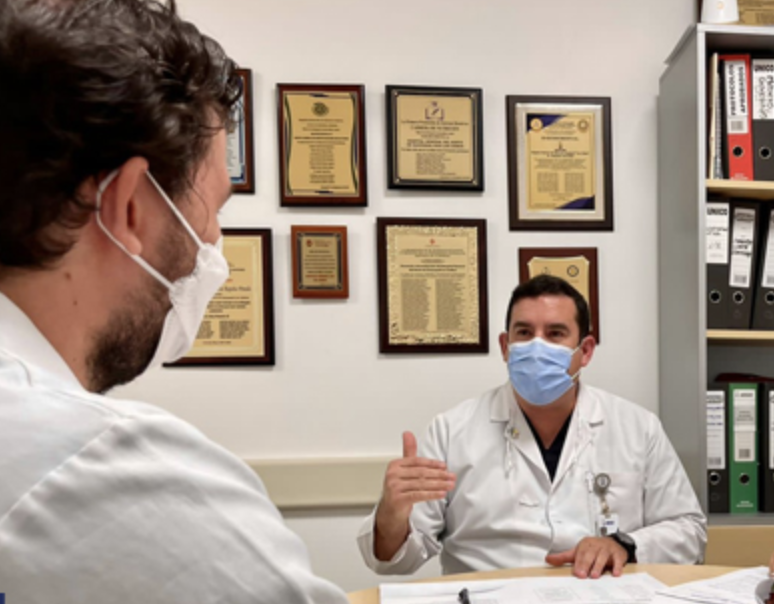There are patients with rare and catastrophic diseases in the IESS hospital in Cuenca who have not been able to access medication due to the lack of specialists who prescribe them.
Ana Idrovo waited six months, from June of this year, for the José Carrasco Arteaga hospital of the Ecuadorian Social Security Institute (IESS) in Cuenca, to deliver the immunoglobulin she requires to treat an autoimmune disease she suffers from.
Although this medication is in the hospital pharmacy, she couldn’t receive it because there is no specialist to order the prescription. In September 2022, the doctor covering that area resigned and the position has been vacant ever since.
Dozens of patients suffering from catastrophic or rare diseases are in the same situation, including more than 300 children, who have not been able to receive treatment in the last six months due to a lack of specialists.
María Eulalia Delgado daughters, who need to be treated by both an endocrinologist and a pediatric neurologist, have been dealing with the same issue. One of her daughters needs to be prescribed medications for a growth hormone deficiency and the second was diagnosed with precocious puberty.
“Getting an appointment with the specialist and the pediatrician is extremely difficult,” says Delgado, who won a protection action against the hospital so that her daughters can access the care and treatment they require.
There is a deficit of immunologists, geneticists and endocrinologists, says Carolina Quintuña, a representative of patients with primary immunodeficiencies. “And it’s not just us, there are many patients with other pathologies who are going thru the same ordeal,” added Quintuña.
Failed calls
Tania Carrera, technical director of the José Carrasco Arteaga hospital, admits to the lack of specialists to treat these types of pathologies. But she insists that the institution has tried to solve this problem.
“We acquired the medication, but due to circumstances that are out of our hands, the specialist doctor resigned in May 2022,” said Carrera about the situation of pediatric patients with hormonal problems.
According to her, because the hospital lacks the needed specialist, they referred patients who need to be seen by one or more professionals to the public or complementary health network. But that external provider did not deliver the medications either, although it did provide the medical care needed.
Amidst the turmoil of these IESS patients, the hospital hired a pediatric endocrinologist on Wednesday, December 7th. But it still doesn’t have the specialists for patients with other rare and catastrophic pathologies.
Recruitment is not easy, says Carrera. For example, since September, when the immunologist resigned, the hospital has made six attempts to fill that vacancy, without success.
Being experts in rare diseases, these specialists are also scarce, she says. On top of this, the specialist doctors who would assume these positions know that the job will be very stressful as they faced the anger of the patients who have been unable to receive care for months.
The technical director of the hospital would not specify the number of specialties and subspecialties that have open positions. She would only say that there are 51 specialties and subspecialties that have all the necessary doctors.
Immunocompromised patients worry that doctors are in the hospital but cannot reach them due to the lack of a specialist. “We want to know when we can receive the treatment because we are in a vulnerable situation,” claims Carolina Quintuña.
Affiliates announce legal measures
This situation has led IESS members to take a series of actions against the IESS hospital in Cuenca. On Thursday, December 8th, a group of patients and their families staged a sit-in in Calderón Park, in front of the Azuay Governor’s Office.
They delivered a manifesto and announced that they will take legal action if the IESS does not respond to their requests. “We demand that comprehensive, viable and projected long-term solutions be provided within a maximum period of 30 days,” says part of the statement.
“There are a series of situations, linked to bureaucracy and negligence that put the lives of children at risk,” claimed Ernesto Arbeláez, representing the parents of children with rare and catastrophic diseases.
The lack of doctors for these pathologies adds to the constant claims of affiliates and retirees due to the difficulty in accessing appointments with specialists at the José Carrasco Arteaga hospital. The difficulty in getting an appointment occurs due to the high demand that José Carrasco Arteaga has, since it receives patients from Azuay, Cañar, Morona Santiago, Loja, Zamora Chinchipe and even from Guayas.


0 Comments